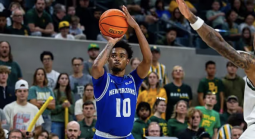CNN is Latest Media Outlet to Trash Sports Betting
CNN broadcast a one-hour program Sunday night on legal sports betting in the United States and to no one’s surprise, the show mainly focused on negative aspects of the activity.
The latest episode of “The Whole Story with Anderson Cooper” featured correspondent Nick Watt visiting the Circa Casino sportsbook in Las Vegas and interviewing employees and sports bettors.
He also interviewed a 24-year-old professional sports bettor who claimed to be making a lucrative living with the pastime.
So far so good, but then the roof fell in for the legal sports betting industry, at least the way CNN saw it.
A man was interviewed who lost his life savings betting on sports and then contemplated suicide.
Another man, who embezzled millions of dollars from his employer, the Jacksonville Jaguars of the NFL, so he could bet on sports, was interviewed from prison.
A shrink from UCLA decried the rise in bankruptcies due to legal sports betting.
Another shrink warned about the dangers of addiction.
Other anti-gambling advocates bleated the typical doom and gloom that they said comes from betting on sports.
Just about the only one who was interviewed who defended legal sports betting was Bill Miller, the president of the American Gaming Association, a lobbying group for the legal gambling industry in the U.S.
He claimed only 1% of people who gamble become addicted.
CNN then interviewed a so-called expert who claimed the figure was actually 10%, but no further information was provided as to which figure was actually correct.
CNN also reported that while no national figures were available, official gaming figures from the State of Connecticut show that 70% of the gambling losses in the state come from just 7% of the gambling public, who are deemed “addicts.”
Charlie Baker, who was the governor of Massachusetts when sports betting was legalized in that state and who is now the head of the NCAA, was also interviewed and he had split opinions on sports betting.
He said he supported legal gambling on games, as he did when he was governor, but that he opposed proposition or “prop” bets on individual athletes, because of the ire some athletes faced from bettors when they lost, including death threats.
Those interviewed on the show included Dr. Timothy Fong, co-director of the UCLA Gambling Studies Program, Dr. Harry Levant, a certified gambling counselor and former gambling addict, Mark Gottlieb, executive director of the Health Advocacy Institute, Richard Daynard, president of the Public Health Advocacy Institute, Isaac Rose-Berman, a professional sports bettor and Danny Funt, who wrote a book about sports betting called “Everybody Loses.”
Viewer reaction to the CNN broadcast was mixed.
Gambling 911 publisher Chris Costigan said: “People with addictive behavior probably should not be gambling. Two of the people interviewed stole funds from clients and/or their employer.
“These individuals were already predisposed to steal. Gambling didn’t turn these individuals into criminals.
“If I had to bet, pun intended, I’d have to say probably way more than 10% of gamblers have addictive personalities. If you are gambling to try to get out of financial ruin, that’s an inherent character flaw. Gambling didn’t cause that.”
Kris Benton, a Virginia gambler who famously won a six-figure soccer wager with BetMGM last year and got stiffed until Gambling 911 intervened by exposing the fraud, said: “I thought it was a good look at the dark side of the betting world. There’s definitely some predatory things that the online sportsbooks, just like casinos, do to capitalize on those who win or lose a lot.”
Gadoon “Spanky” Kyrollos, a professional sports gambler from New Jersey who helped found the Sports Gambling Hall of Fame, which is located inside the Circa Casino in Las Vegas, said: “I liked how the Sports Gambling Hall of Fame was shown on the broadcast.”
By Tom Somach
Gambling 911 Chief Correspondent














